IN FOCUS: Underage and on dating apps - what are the dangers, and how can minors be protected?
CNA looks at how adult predators are going after youths under 18 on dating applications, and what these apps are doing to prevent and mitigate this.
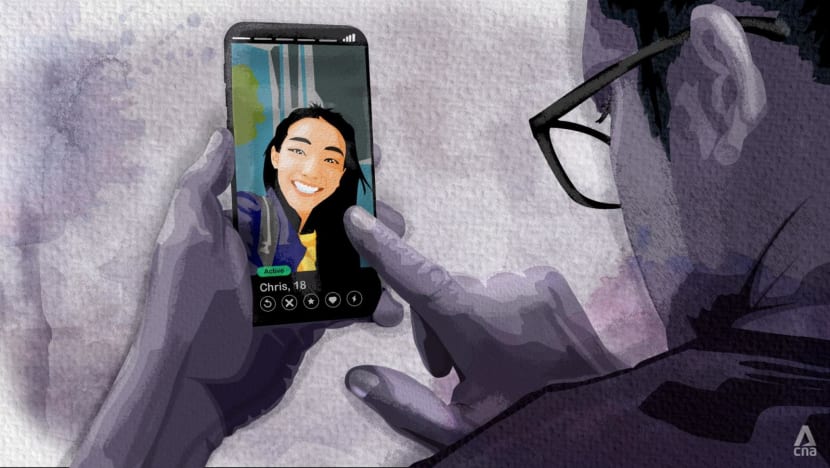
A man looking at the profile of an underage girl on a dating application. (Illustration: Rafa Estrada)

This audio is generated by an AI tool.
- Dating apps only allow adults 18 and older to sign up for accounts, but the restriction is easy to bypass, and some minors end up becoming victims of sexual crime
- CNA created several profiles on three dating apps and received sexual propositions from some men even after they were told they were speaking to underage users
- Experts said children and youth who join dating apps may be vulnerable, not just because of their age but also their state of mind
SINGAPORE: Within an hour of chatting with 49-year-old Gary, Christine was invited to his house.
She was naturally apprehensive. Still, the teenager, who had indicated on dating application OkCupid that she was 18, continued the conversation even after he suggested she wear a “short dress” or “tube” top on their first date.
Gary said his wife and daughter were going abroad in November during the school holidays. “Will be alone at home dear,” he wrote with kissing face and hugging emojis.
The next day, she told him she was actually 15. That only seemed to spur him on.
“I should call you baby then dear. U ever had an older bf dear?” he asked with kiss mark emojis.
When Christine seemed open to the idea, Gary began telling her graphic sexual things he wanted to do to her.
Little did he know that it was bound to go nowhere.
Christine was a persona adopted by a CNA journalist to establish whether predators lurk on dating apps to make contact with users below the age of consent.
Upon revealing this to Gary, the conversation disappeared from the journalist’s chat history – a sure sign he had either blocked her or was banned from the app.



Over the course of about a month, CNA journalists created several such personas on apps popular among Singaporeans like OkCupid, Grindr and Tinder.
The journalists used AI-generated photos and indicated on the apps that they were aged 18, the minimum age required to create an account. While chatting with other users, the journalists eventually revealed they were below 16, the age of sexual consent in Singapore.
Aside from Gary, several adults grew bolder after learning they were chatting with an underage teen.
One 45-year-old man on Grindr, which is used by gay men, asked for “cuddles, kisses” and more sexual acts upon learning the “boy” he was talking to was 15. This was before the journalist revealed their true identity.
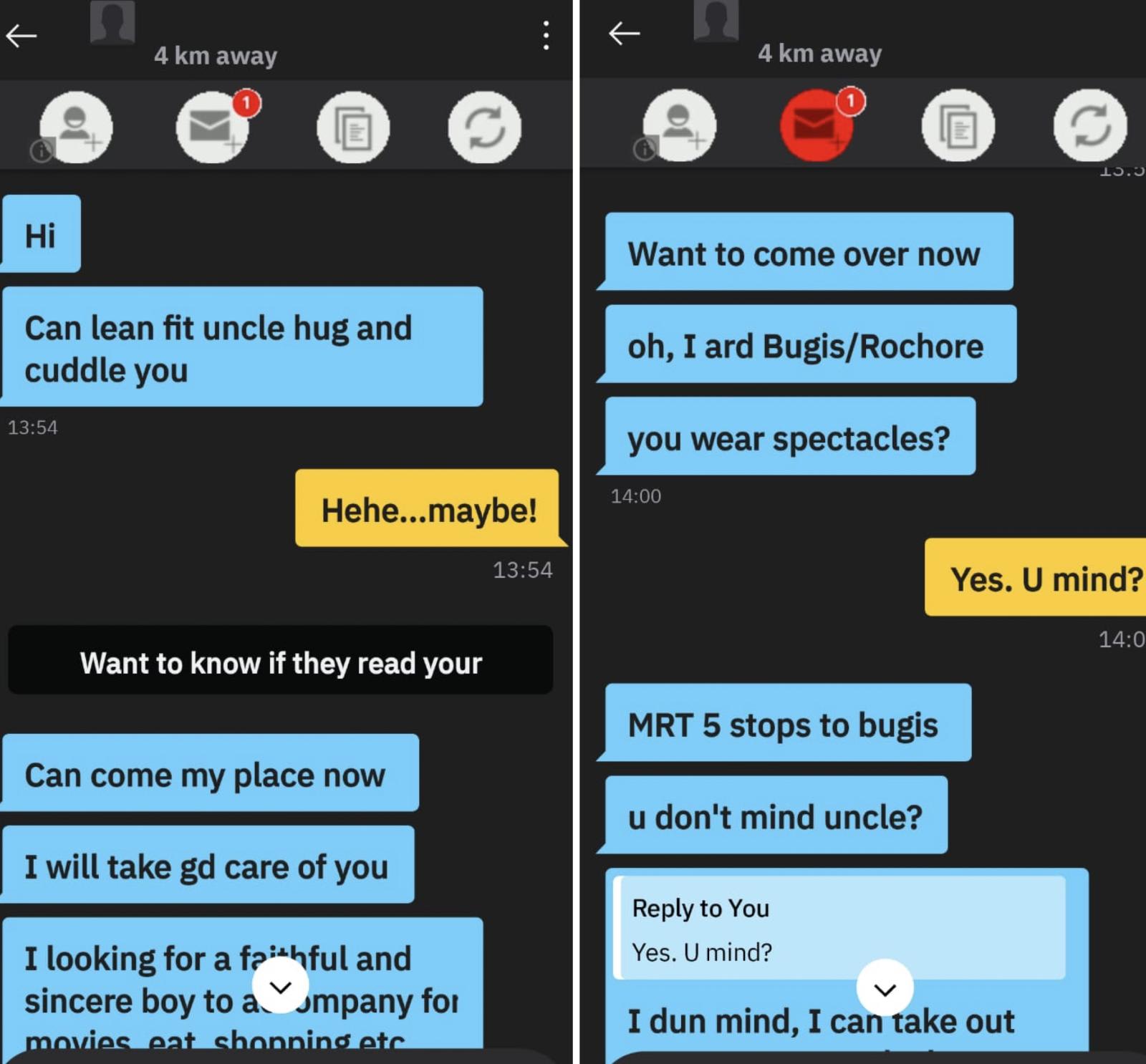
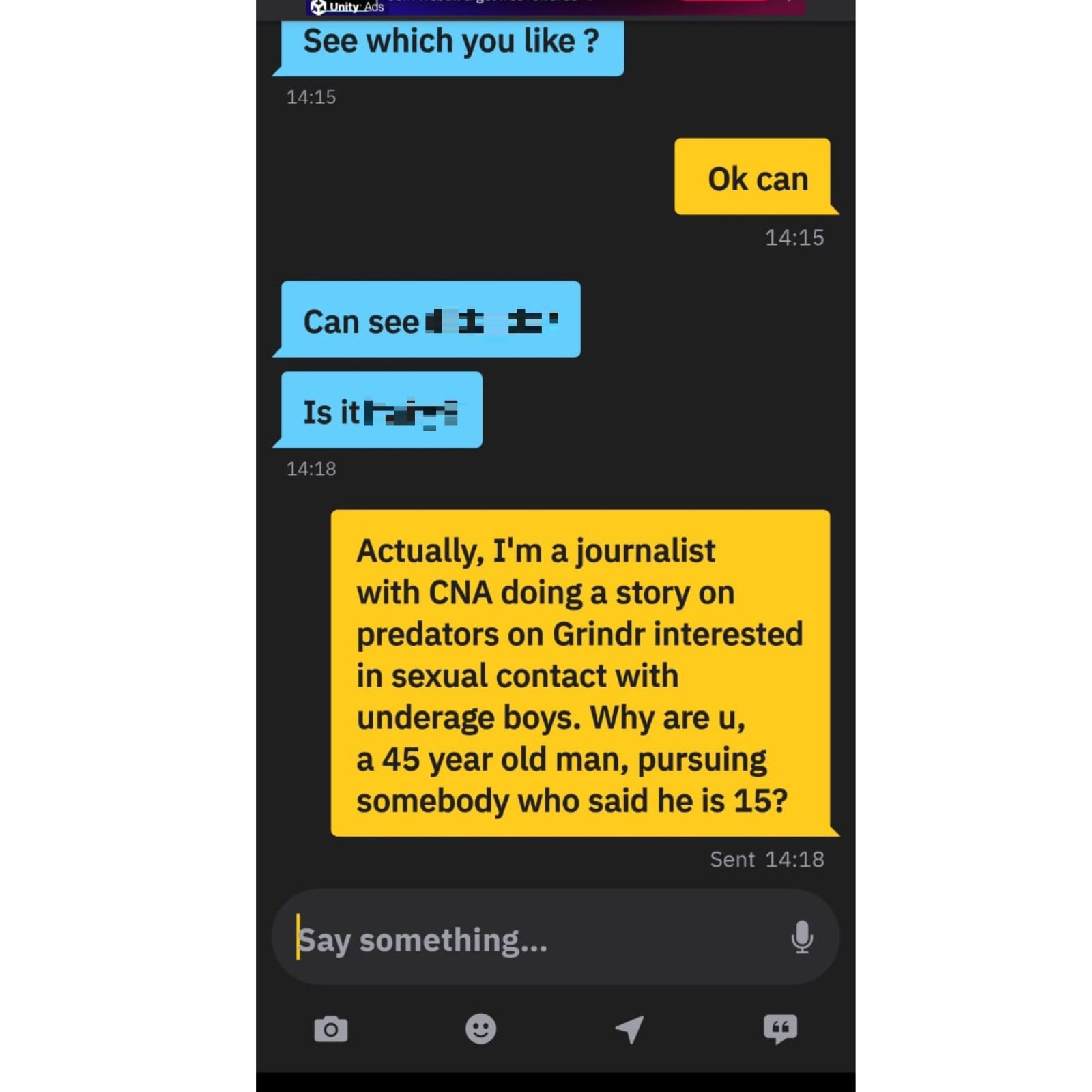
ISSUE RAISED IN PARLIAMENT IN 2021
The problem of minors being preyed upon through dating apps or websites has plagued the world, including Singapore, for years. Multiple men have been hauled to court here for various sexual offences against underaged children they met on the apps.
In a high-profile case, American mixed martial arts instructor Joshua Robinson was sentenced to four years’ jail in 2017 for sexual offences against minors. He had met his 15-year-old victims on the OkCupid and MeetMe dating websites and engaged in sexual acts with them.
Children as young as 10 have been preyed on through these apps. In 2021, a former Singapore Armed Forces regular was sentenced in court for sexual offences such as asking a 10-year-old, whom he had met on Tinder, to send him a nude photo of herself.
Most recently, a part-time religious teacher pleaded guilty to sexually abusing several teenage boys – including one who was 11 years old when he met the offender on Grindr. The offender has not been sentenced yet.
Such news reports and ones about minors being exposed to pornography and sugar dating led Member of Parliament Lim Biow Chuan (PAP-Mountbatten) to raise a question in parliament in September 2021.
Sugar dating is a transactional dating relationship between an older wealthy person and a younger person. Payment is given in the form of money or gifts, among others, in exchange for companionship or a dating-like relationship.
Mr Lim told CNA: “I felt that if we don’t do anything to protect our vulnerable minors, they are likely to gain access to these websites easily, and in that process, they will be taken advantage of.
“My hope was that the government would introduce a law to make sure that technology companies take action to prevent minors from accessing such sites,” he added in reference to his parliamentary question.
In Japan, local laws require users of Tinder – the most downloaded dating app globally – to verify their age using official identification documents such as a driver’s licence, passport or health insurance card.
Heart of the Matter podcast: Are stronger safeguards needed to prevent online grooming of minors?
In a written response, Minister for Communications and Information Josephine Teo said action can be taken under the Penal Code if there is sexual communication or grooming of a minor.
She highlighted cyber wellness education in schools and the option of using parental control services.
Sites that facilitate illegal activities can be blocked by the Infocomm Media Development Authority (IMDA) under the Internet Code of Practice, she added.
Since then, the Online Safety Code – which requires designated social media services to curb the spread of harmful content on their sites to protect users, including children – has come into effect. The categories of harmful content include sexual content and content facilitating vice and organised crime.
IMDA’s designated social media services do not include dating apps.
Two years after his question was raised in parliament, Mr Lim told CNA he was not comfortable with the state of sexual offences in Singapore and remained concerned about minors on dating apps given the easy access to the Internet.
“If we don’t do anything, then there’s a likelihood that people will get exposed to sites with various sexual (content) too early in their lives, when they’re really not ready to understand the concepts involved.”
ONLY FOR ADULTS AGED AT LEAST 18
CNA contacted OkCupid, Tinder and Grindr to find out more about their age verification measures, given how users can easily declare fake birthdays as CNA did when signing up for accounts.
CNA also asked how the companies plan to tighten their sign-up processes to ensure minors cannot use the apps, and what measures they have to ensure predators are not using the apps to approach minors.
All three apps are based in the US. OkCupid was first launched as a website in 2004, while Grindr and Tinder were launched as mobile apps in 2009 and 2012 respectively.
While OkCupid did not respond to queries, Tinder and Grindr both said their apps are only for adults aged 18 or above, with users being asked to attest to their age before creating an account.
Both apps also allow users to report suspected underage users or profiles that may depict a minor.
Grindr does not require users to upload a profile photo or picture ID, unlike Tinder and OkCupid, which are owned by the same parent company Match Group.
While using AI-generated photos on Tinder and OkCupid, CNA journalists had mixed experiences. One journalist’s OkCupid account was banned within two days of creating it without any clear reason, but not before a 30-year-old man asked if she was keen to have a “cuddling companion that pampers you” and offered to meet at his “condo near town”.

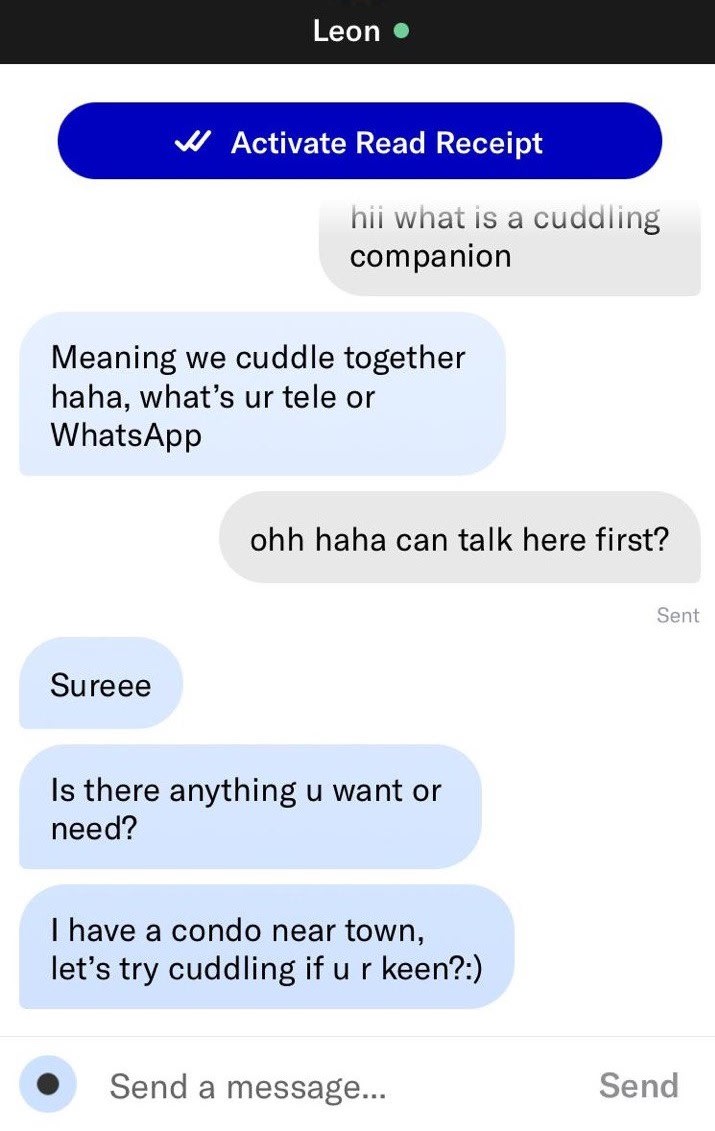
Another journalist’s OkCupid account, which was created in late September using the Christine persona, remained up as of early November. A Tinder account with the same photo and persona also remained active.
Some users called the AI-generated girls “cutie” or said she had extraordinary looks, but others simply sent messages such as “what’s this AI pic”.
The apps did not respond specifically to questions about these photos, such as whether there are measures in place to detect them.
PHOTO + ID VERIFICATION
A Tinder spokesperson said it uses “a network of industry-leading automated and manual moderation and review tools, systems and processes”, and invests significant resources to prevent and remove minors from our app.
“These tools may include automatic scans of profiles, manual reviews of suspicious profiles, activity, and user-generated reports, as well as blocking identifiers associated with underage users trying to circumvent these restrictions,” she added.
This gelled with CNA’s experience on the app. One journalist was immediately banned when she tried to indicate her age as below 18 while signing up for a Tinder account.
Using a different device and phone number, the journalist created another account but used a picture with no humans in it. She had to solve a puzzle to prove she was a "real person", but her account was later locked because of "recent activity".
She submitted real selfies to verify her profile but was again banned.
When another journalist attempted to create an account using photos without humans, she was asked to perform a photo verification.
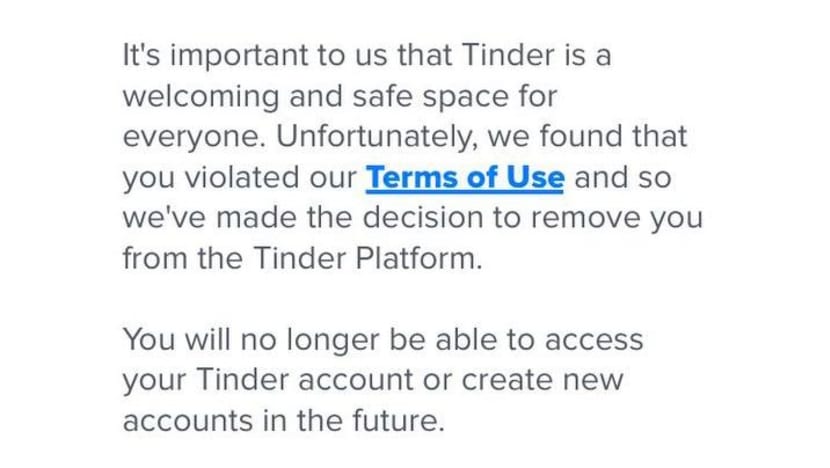
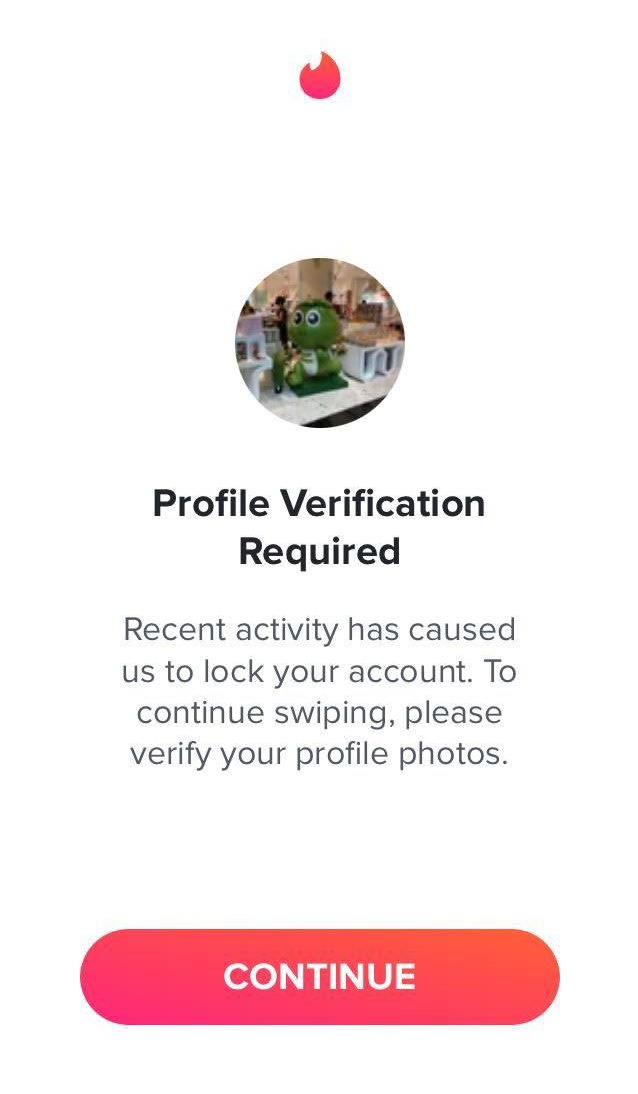
In terms of verifying a user’s identity, Tinder released a video selfie functionality earlier this year to complement its existing photo verification feature. The latter is voluntary – those who use it will have a blue checkmark on their profile.
In 2021, Tinder said it would progressively make ID verification available to users around the world, on top of photo verification. The feature would be voluntary except where mandated by law, such as in Japan.
It was first rolled out in 2019 in Japan, and Tinder said it retains the ID for up to 90 days following the verification.
Last month, Tinder announced a trial of this enhanced ID verification process in Australia and New Zealand.
To be ID verified in these countries, users have to submit a video selfie as well as a valid driver’s licence or passport. The app will then check to see whether the face in the video selfie matches the photo on the ID and the person’s profile photos. It will also check the date of birth on the ID.
Tinder said it “plans to take the learnings from this pilot” as it explores expanding this function to other regions in the future.
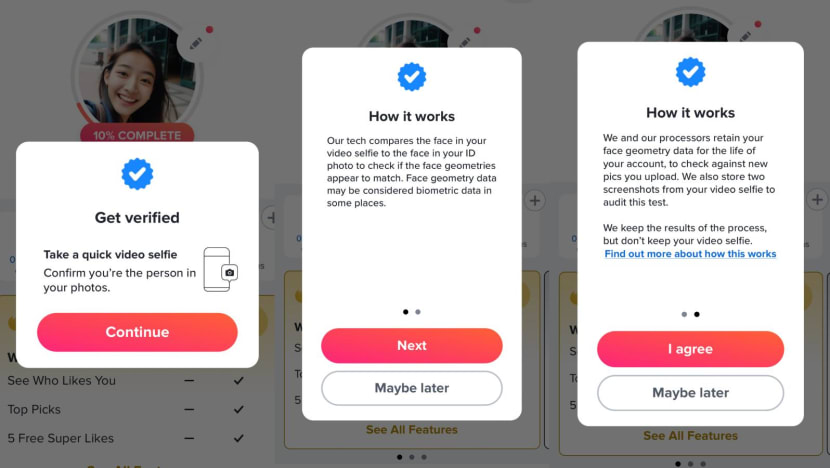
WHEN DO APPS TAKE ACTION?
According to OkCupid’s website, users must be 18. The app also encourages users to report profiles that they suspect have been made by someone under that age.
OkCupid further noted that it will ban profiles that “knowingly engage in conversation with someone who has revealed themselves to be under 18”. But men who continued to pursue Christine after she revealed that she was actually 15 still remain active on the apps.
Besides Gary, a 27-year-old called Drake maintained his eagerness to meet Christine in person.
He began calling the journalist “mei mei” (Chinese for younger sister) after she said she was 15, but was careful to say that they could only engage in sexual acts when Christine turned 16 at the end of the year.
Nevertheless, he talked at length about booking a hotel room in Johor Bahru over the weekend, and sought Christine’s level of interest in having a threesome when she was of legal age.
This journalist then arranged to meet him for a movie on Friday night but later gave an excuse. The conversation stopped there.
Christine’s OkCupid profile also remains up as of the publication of this article.
While the app had earlier given the journalist a prompt to become verified through a video selfie which should match the profile photos, this was not mandatory – similar to Tinder.
Meanwhile, a Grindr spokesperson said it blocks or shuts down accounts created by users under the age of consent because this violates its terms of service.
During CNA’s experiment, a journalist created some accounts on Grindr and revealed to a man in Singapore that “he” was actually 15. The man asked the journalist what “he” was doing there, before eventually suggesting to “slowly explore” and asking if school had ended already.
Eventually, the man proposed meeting before school began, in order to perform mutual sexual acts.
CNA could not continue this conversation as the account was subsequently banned. Another user, upon learning the journalist’s “true age” of 15, had warned the journalist not to send nude photos to people and to “protect yourself”.
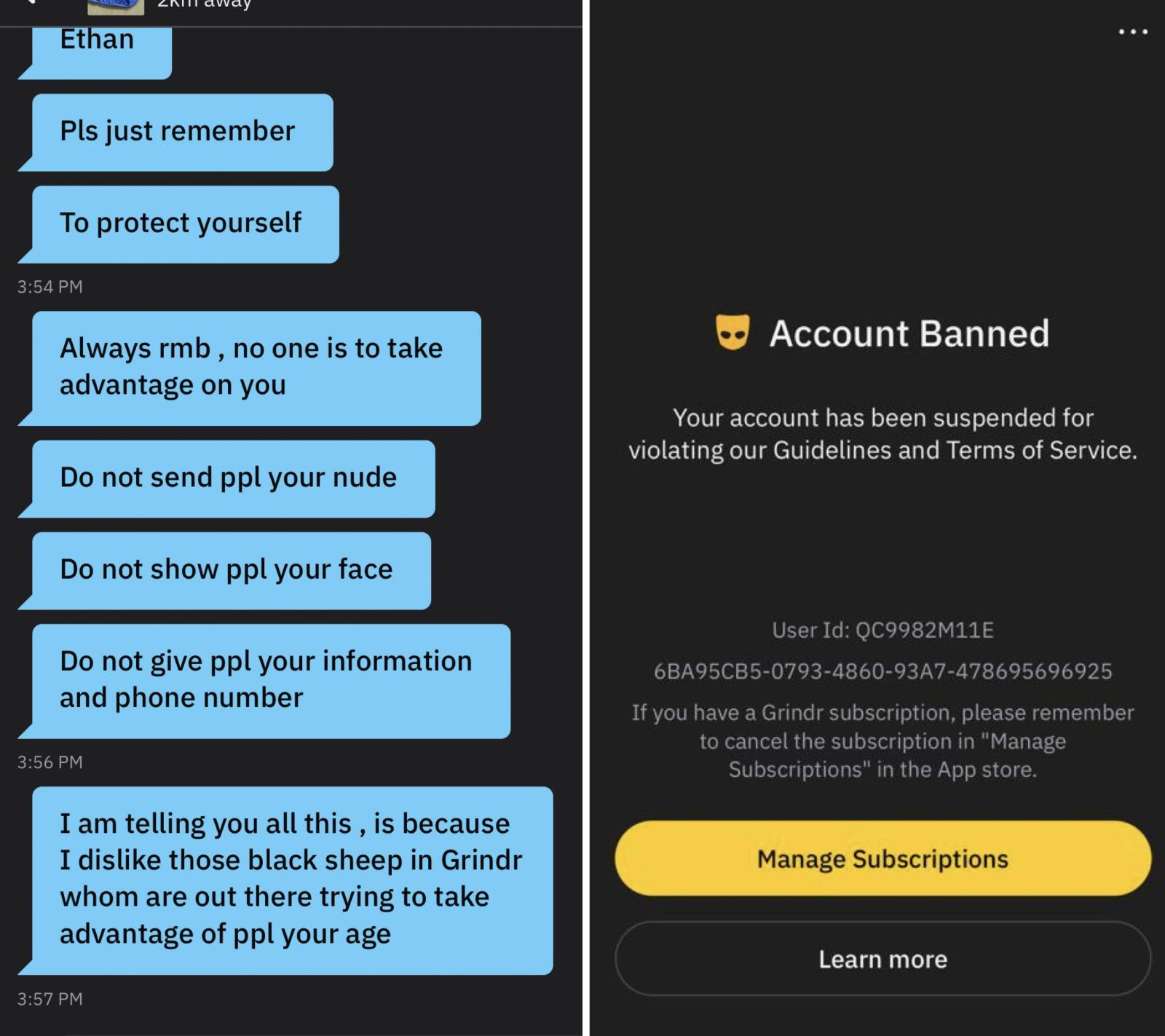
The Grindr spokesperson also said the app is classed in the 17+ category on both Apple and Google Play App stores, which means parental control settings in both operating systems can be used to prevent the app from being downloaded.
She added that Grindr is “always willing” to work with Apple and Google to develop better age gating technology that respects users’ privacy while improving safety.
As for why Grindr does not require users to upload a profile photo or picture ID, the spokesperson said that user concerns are a key reason for this. Users can privately share photos using private albums.
She added: “Since the founding of Grindr, many of our users have had very real needs to maintain privacy and discretion on the app, ranging from highly personal circumstances to government persecution in more than 60 countries around the world where it is tragically still illegal to be a member of the LGBTQ+ community.”
Nevertheless, she said Grindr “works constantly to eliminate illicit activity from the app”, including using AI and machine learning “in a variety of ways to promote safety, including monitoring chats to detect potential underage users”.
On top of that, Grindr has an external moderation team of more than 150 experts to monitor chats and identify issues such as underage users and those who may try to target them. It also reports activity involving minors to organisations committed to protecting children, including the National Center for Missing and Exploited Children in the US.
CNA also asked OkCupid, Tinder and Grindr about whether they were open to partnerships like the one that dating app Bumble recently formed with the Association of Women for Action and Research (AWARE), a gender equality advocacy group in Singapore.
The partnership, announced in September, allows AWARE to report harmful or dangerous people to Bumble’s dedicated member safety team.
Through this new tip line, these people can receive a warning or even have their profiles removed from the platform.
In a press release, Bumble said this is aimed at reducing the burden on victim-survivors of sexual violence and technology-facilitated abuse to report these harms, while ensuring that dangerous individuals are proactively removed from Bumble.
OkCupid, Tinder and Grindr did not directly respond to queries about this.
“THERE’S REALLY NO VERIFICATION”
Notwithstanding dating apps’ various measures to keep the underaged from using them, some users told CNA how easy it was to sign up when they were below the age of 18.
Ms Li, 23, is no stranger to such apps. She first started using them as a 17-year-old.
“There’s really no verification, so I just put my age as 18. I had almost everything actually, I had Bumble, OkCupid, Hinge, Tinder.”
Feeling guilty for lying about her age, Ms Li wrote in her profile that she was 17, going on 18. Despite doing so, the apps did not detect that an underage user was on their platform.
In fact, Ms Li said her profile became more popular after she updated her bio. “Once I put that, then I actually got more matches.”
She added that she was far from the only underaged teen on dating apps.
“Pretty much every girl I knew that was in upper-secondary school would have been on the more common apps, like OkCupid.” They would send profiles to each other to see who their friends matched with, she said.
Some of the men who matched with her on the apps were 10 years her senior, but it did not raise any alarm bells back then. She said she felt lucky about it, thinking that these older men were taking a chance on her.
It was especially gratifying given that some boys in her age group still shunned girls. “A man likes me - he isn’t immature like the boys," she said.
“At that age, it was very, very easy for girls to be looking for that attention and validation.”
“YOUR HEART IS OPEN” ON DATING APPS
That’s where the danger lies, and where dating apps differ from social media platforms that underage users may also sign up for, said Mr Chong Ee Jay, cyber wellness expert at Focus on the Family Singapore.
“(On dating apps,) your heart is already very open. You're seeking, you want attention, you're looking for a partner, you're looking to fill certain voids, answer certain doubts that you have,” he told CNA.
Such a state of mind makes the user more vulnerable, he said.
Associate Professor Victor Lim of the National Institute of Education (NIE) echoed that sentiment.
“Participants on dating apps have an explicitly different set of purposes than participants on games and social media,” he said.
“Children and youth, by presenting themselves on such apps, may send the wrong signal and expose themselves to the risks of online predators seeking to exploit them,” said Assoc Prof Lim, who is involved in cyber education in Singapore.
He said he believes the apps should face penalties if children and youth under 18 are found on their sites.
“This will communicate the sense of responsibility and accountability that app providers have and to encourage them to put in place meaningful and effective checks to disallow minor accounts,” he said.
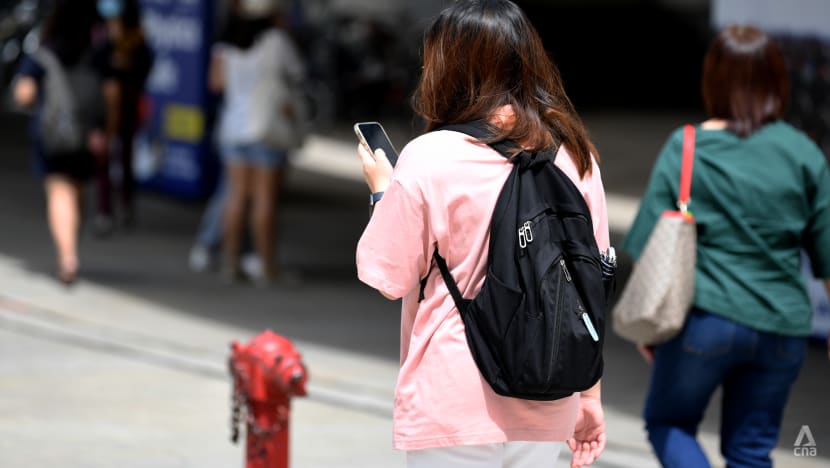
Mr Chong said some youths may have tried to find empathy from people in their lives offline but failed to do so and feel lonely. Parents and other adults may focus on the behavioural issues, and that can become a roadblock.
“If the child cannot turn to a seemingly trusted person in their circle of real-world relationships, they naturally would want to find somewhere else and the internet becomes the next easiest way,” he said.
Predators on such apps may gain trust by chatting normally with these youth, instead of immediately jumping to sexual propositions.
Some youth may struggle with their self-esteem and get a boost of confidence when an older, attractive person gives them attention.
“They like me so much, they want to talk more to me, they’re interested in my life, my school,” he said.
“By the time the conversation reaches the next level, where it is inappropriate or it turns ugly - for the young person, it’s too late, (they’re) too emotionally committed to pull out.”
That’s why in some cases, the victims accede to inappropriate requests from the perpetrator, he said.
“I try not to think too much because I get quite depressed, I’m worried for my own son, 8 years old, what’s he going to face in the near future?”
Mr Chong said he is especially concerned because youths are still going on dating apps despite receiving digital literacy education in schools, where they are warned that they may be inappropriately propositioned or encounter people with dubious intentions.
That said, education still must go on, he said.
“It’s not that it’s not working, but I think (it cannot just be) head knowledge, we are dealing with the psychological development of a young person,” he said, adding that youth may want to take risks and try things out for themselves.
“It’s a very multi-layered situation, some are driven by peer pressure, just for the thrill-seeking and fun of it.”
Mr Chong said parents should try to be engaged and involved in their children’s online lives and go beyond the surface to find out what the root issues are – which could be loneliness, peer pressure or escapism.
Ms Li said her parents still do not know that she used dating apps when she was 17.
“I was surprised by how easy it was to hide it from my parents,” she said, adding that it made her wonder what she would be in the dark about if she has children of her own in the future.
She met up with one 25-year-old for a meal, but was ghosted after the date. “I was very sad but in hindsight, it’s good that he did.”
She was also supposed to meet with someone who said he was 27, but he stood her up. Earlier this year, she matched with the same man on an app. She later learned that he was dating another woman - and he was actually 50 years old.
Looking back, she’s relieved that she was not preyed on or groomed.
“Thank God nothing bad happened.”




















